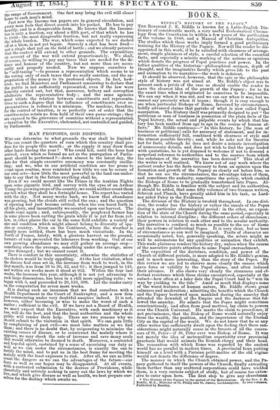MAN PROPOSES, GOD DISPOSES.
Wrio can determine to what grounds the war shall be limited ? Who can count the quarters of corn which this country shall pro- duce for its people this month; or the supply it may draw from other lands during the year ? Who could tell, until the hour had arrived, even when so formal an act as the prorogation of Parlia- ment should be performed P—down almost to the latest day, the date for that simple executive ceremony was constantly oscilla- ting; and we, who in our artificial condition are too prone to smut upon routine, were reminded how little we can be secure of our own acts—how little the most powerful in the land can under- take to say that in the future anything shall be. Even if we could mount like the Prince in the Arabian Nights upon some gigantic bird, and survey with the eyes of an Arthur Young the growing crops of the country, we could neither count them nor tell what they shall be a fortnight hence. The report has varied with the sky. Not many weeks back, we knew that abundance was growing, but the clouds still veiled the sun ; and the question of ripening hadjust become critical, when the sun burst forth in all his glory, and incontinently we counted upon our harvest. The clouds came again ; and, subsequently, the perplexed farmer has in some places been cutting the grain while it is yet far from yel- low, in other places the ear in the same field exhibits a variety of size and condition which might almost belong to diversity of spe- cies or country. Even on the Continent, where the weather is usually more settled, there has been much vicissitude. In the North of France, lately, with a glorious harvest on the ground, torrents of rain prevented the labourers from working. Out of our own growing abundance we may still gather an average crop— something above the average, something under the average, more or less damaged ; but we cannot count it. There is comfort in this uncertainty, otherwise the statistics of the cholera would be truly appalling. At the last visitation, when the disease had once set in, the increase from week to week, in the first month, was from 10 to 36, 52, and 62 ; it then jumped to 143, and within six weeks more it stood at 952. Within the four last weeks, the increase this year, although it is not yet advancing to such large dimensions, has been in a still more appalling ratio ; we began with 5, and proceeded to 26,133, 399. Let the reader carry on the computation for seven more weeks. It is during such an incursion that we find ourselves with a Health Department in the Court of Bankruptcy, and a new firm Just commencing under very doubtful auspices indeed. It is not, however, either becoming or wise to make the worst of sueh a matter ; sufficient is the evil. If we have not a Board of Health, we must expect that the Executive, with such machinery as it has, will do the best, and that the local authorities and the whole public will render their help. There are two reasons why we should submit to the visitation in that spirit. We can gain little by complaining of past evil—we must take matters as we find them; and there is no doubt that, by cooperating to minimize the existing causes of disease, or to counteract the malady where it appears, we may check the rate of increase and save many souls that would otherwise be doomed to death. Moreover, a contented and hopeful spirit, sustained by a sense of exercising our duty as well as we can under the circumstances, is exactly the one to fortify the mind, and to put us in the best frame for meeting the malady with the least exposure to risk. After all, we can as little Count the dangers as we can the advantages of the future—our fears as well as our hopes may be disappointed. At all events, With a contented submission to the decrees of Providence, while Cheerfully and actively seeking to carry out the laws by which we live, and which give disease as well as health, we best prepare our- selvea for the destiny which awaits us.


























 Previous page
Previous page